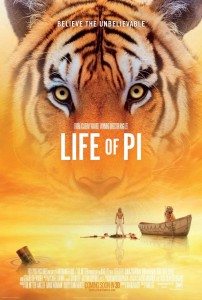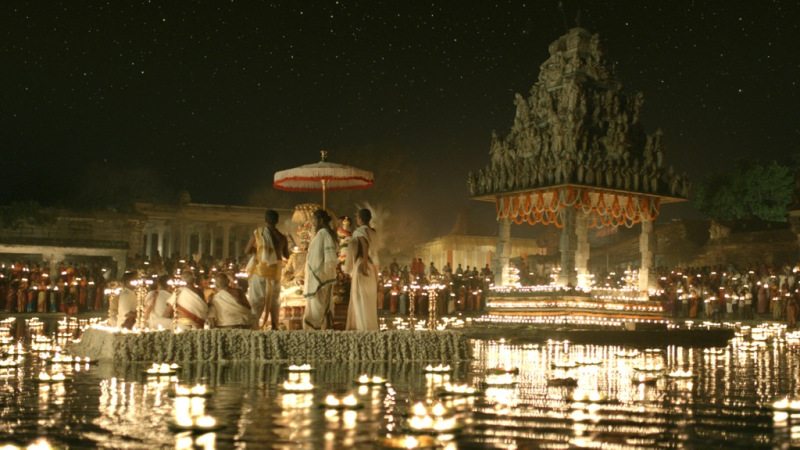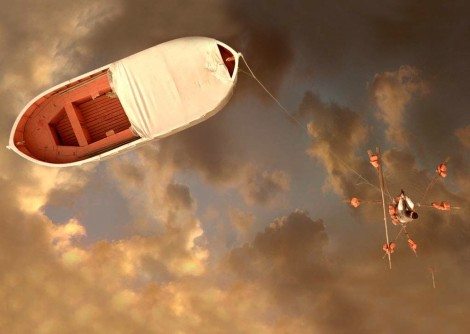A young man. A tiger. A small lifeboat. As the premise for a film, it’s intriguing. One simply must wonder: just how full of tiger poop can this thing get before it sinks? Or, to put it another way, will Life of Pi win more Oscars than a dead president, some Iranian hostages, or two crazy people dancing?
Let’s find out.
Those of you with long memories may recall that after seeing the trailer I swore I would not go to see Life of Pi. Well, I did anyway. Deal with it. I had to find out (or see Les Miserablés).
And there’s good news and bad news.
The good news is, I was right about how the whole thing would look like a My Little Pony play set on acid and about how the film would be absolutely dripping with schmaltzy music that would make you want to lift up your head and sing a paean to the clouds (assuming you were an absolute drooling moron and your parents had locked you into your special underpants again).
The bad news is, you might have to see it anyway. Because despite the lack of narrative or visual subtly and despite the ghastly score and even with a story that reminds me of an episode of Davey and Goliath, I liked good portions of it.
How’s that for resounding praise?
But no. Once I figured out what was bugging me so severely about the clunky and unnecessary first half hour, I settled in and enjoyed myself. Nodded appreciatively, even.
See, Ang Lee has made a comic book movie. Life of Pi is a comic book movie.
I don’t mean comic books like The Hulk (sorry Ang), but like… well… one of those Indian comics where you read the stories of the Ramayana and such. You’ve read all of those, right? Well, neither have I but I’ve SEEN them.
The thing that bugged me at first was that all the shots in the first half hour were so squarely framed and neatly assembled. All the exposition was frankly delivered or narrated. Like you were reading a comic book, with panels and everything. Which isn’t to say I thought it worked—honestly, I would have cut all of it—but it did, eventually, clue me in as to how I was supposed to be digesting the unfolding story: as a brightly colored myth for kids.
Which it then became.
And I won’t bother recapping the story for you. Either you know it or you want to see it, so it’s unwelcome information. But I will tell you what I liked about it in three simple letters: the goddamned CGI.
Yep. The thing that I normally hate in films—the phony, inhuman, intangible CGI—is here actually quite amazing. Lee and the visual effects team deserve themselves a heap of praise for both the creativity of vision and the execution. Not only did the CGI animals in Life of Pi look unquestionably real, but the scenarios were gobsmacking, too—from weather effects to dream sequences to even (and I’m sorry) the My Little Pony play set on acid in 3 stinkin’ D.
And then it sort of ended with a nice pat on the head and a free coupon to redeem your contemplation for the story’s meaning wrapped up like a tiger in a lifeboat.
Maybe you should go late and leave early? Just sayin’.
Also, tigers are awesome. I’m gonna get me one. And a handful of Academy Awards. Best Miraculously Constipated Tiger in Lifeboat goes to… WHAT! Christoph Waltz?!?!?
Damn. Robbed again.





Don’t you have anything nice to say?
I have this: m. night shyamalan had nothing to do with this movie, and for that I am thankful.
yes. i thought the CGI was stunning. very creative and inventively used. but i’m pretty sure i said that already.
I have a major soft spot for Ang Lee’s Hulk. It’s not close to perfect but I love that he tried something different, I really like how the film ebbs and flows and has these strange moments of quietness and the crazy psychological stuff going on.
The comic book formula is locked down now. I doubt we will ever see a director ever given a similar level of creative freedom when making a comic book adaptation again and that’s a real shame. It’s an ambitious failure.
In terms of style and editing Scott Pilgrim is the film that really nailed that type of aesthetic and that wasn’t much of a success either.
Don’t think I will watch Life of Pi, looks too schmaltzy for me.
Glad you appreciated Lee’s Hulk. This one is better, though. Again he’s doing something intentional with mise en scene and mood—but in my opinion more effectively (and based on general audience reaction, I’m not alone).
I don’t think the comic book formula is locked down by a longshot. You’re just thinking of Hollywood big budget stuff, which is generally generic regardless of whether it’s about superheros or anything else. For example; if Edgar Wright gets to make Ant Man I bet that’ll satisfy your Scott Pilgrim jones.
Life of Pi actually isn’t that schmaltzy, music aside. The whole middle section—baring a few break aways to the older narrator—is quite engaging and pretty solidly stunning. From when the ship sinks until meerkat island, you’ll be glad you’re there.
This is the type of film I would love to watch on a cold and miserable Sunday afternoon or even on a stinking hot day in Melbourne in a night aircon retro cinema.
Not having read the book made no difference apart from the implication at the end as itwasn’t sign posted as much. Some times I like big sign posts because I get carried away with fantasy. Kinda reminded me of The Fall. Both beautiful films.
Evil Genius is right on the Tiger front. I wantee one now. My little moggie aint big or nasty enough but that tiger looked as real as my credit card balance.
I also enjoyed Scott Pilgrim but then I did grow up with video games and Sonic the spikey one.
Yep. In some ways like the Fall; but I find the Fall to be all fantasy—this managed to be fantastic and yet somehow not unreal.
Honestly, I think you didn’t understand one bit of this film’s “parabola”. I guess you went too late and left too early.
It’s not complex. It’s suggesting there are stories that are hard to believe but which contain capital T truth; i.e. the world’s religious texts. One can explain such mysteries away via rationality, but we don’t find that satisfying. We choose to believe the story with the tiger.
I can see why some people find that a deep and meaningful message.
In the film, though, it’s suggested that hearing this story will make one believe in god. I don’t think that’s actually the case. I think hearing this story will comfort those who already believe in god/religious texts.
But believing or not, the first act is long and extremely expositional. It builds up characters and situations that do no really affect the main bulk of the story. All we need to know is that Pi is travelling with animals and that he’s been experimenting with religion. Then, the ending, breaking away to show him as narrator (and throughout the film) does two things: it takes me away from the story and treats me like I’m an idiot who doesn’t get the “parabola” of the story.
I prefer it when a storyteller trusts that his story speaks for itself.
this is a ridiculous movie. and if you are trying to analyse it, you are just as insane as Pi.